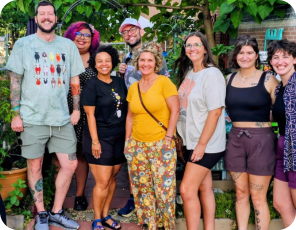Asheville, nestled in the heart of the Blue Ridge Mountains, is not only renowned for its picturesque landscapes and vibrant arts scene but also for its burgeoning community of BIPOC (Black, Indigenous, and People of Color) entrepreneurs who are making significant strides in shaping the local economy.
Diversity Driving Economic Growth
Diversity has long been touted as a catalyst for innovation and economic growth, and Asheville’s BIPOC entrepreneurs are prime examples of this principle in action. These visionary individuals bring unique perspectives and cultural insights that enrich the city’s business landscape. From innovative startups to established enterprises, BIPOC-owned businesses contribute to the diversification of industries such as hospitality, culinary arts, tech innovation, and sustainable practices.

Innovation Through Diverse Perspectives
The presence of BIPOC entrepreneurs in Asheville injects fresh perspectives into traditional industries and catalyzes innovation in emerging sectors. From boutique hotels infusing cultural motifs into their design to tech startups developing apps that address community-specific needs, diversity fosters creativity and drives the city’s reputation as a hub for forward-thinking enterprises.
Market Expansion and Consumer Engagement
BIPOC-owned businesses play a pivotal role in diversifying Asheville’s market offerings, attracting a broader customer base, and enhancing the city’s appeal as a destination. By introducing unique products, services, and experiences rooted in cultural authenticity, these entrepreneurs not only meet the demands of diverse consumers but also set trends that influence local and regional markets.
Job Creation and Economic Resilience
Entrepreneurship among BIPOC communities in Asheville contributes significantly to job creation and economic resilience. By establishing and scaling their businesses, these entrepreneurs provide employment opportunities, particularly within their communities. This not only fosters economic stability but also strengthens social cohesion and reduces disparities in wealth and opportunity.
Building a Supportive Ecosystem
The success of BIPOC entrepreneurs in Asheville is bolstered by a supportive ecosystem that includes mentorship programs, access to capital initiatives, and advocacy for inclusive business practices. Organizations and networks dedicated to supporting minority-owned enterprises provide crucial resources and guidance, enabling entrepreneurs to navigate challenges and seize opportunities for growth.
Cultural Preservation and Community Impact
Beyond economic metrics, BIPOC entrepreneurs in Asheville are custodians of cultural heritage and champions of community engagement. Through their businesses, they preserve and promote cultural traditions, celebrate diversity, and foster a sense of belonging among residents and visitors alike. Community-centered initiatives and partnerships amplify their impact, creating spaces that reflect and honor the city’s multicultural tapestry.
Empowerment Through Entrepreneurship
Entrepreneurship serves as a powerful vehicle for empowerment within BIPOC communities. By establishing their own ventures, entrepreneurs in Asheville not only create economic opportunities for themselves but also for others within their communities. Through mentorship, networking, and community support initiatives, they foster an environment where aspiring BIPOC entrepreneurs can thrive and succeed.
Through entrepreneurship, BIPOC individuals not only create wealth for themselves but also generate job opportunities within their communities. This economic empowerment extends beyond financial gains, fostering a sense of pride and resilience among community members. By serving as role models and mentors, BIPOC entrepreneurs inspire future generations to pursue their dreams, believing that success is attainable regardless of background or circumstance.
Moreover, entrepreneurship allows BIPOC individuals to address unmet needs within their communities. From providing culturally relevant goods and services to advocating for social justice causes, these entrepreneurs catalyze positive change. They leverage their businesses as platforms for advocacy, promoting inclusivity, diversity, and equity in Asheville’s economic landscape.
Cultural Enrichment and Community Engagement
Beyond economic contributions, BIPOC entrepreneurs play a pivotal role in enriching Asheville’s cultural fabric. Through their businesses, they celebrate cultural heritage, promote inclusivity, and create spaces that resonate with diverse audiences. Whether through art galleries, specialty shops, or community events, these entrepreneurs foster dialogue, understanding, and a deeper appreciation for diversity within the city.
The cultural enrichment and community engagement efforts of BIPOC entrepreneurs in Asheville go beyond business success. They foster a sense of unity and celebration, creating a more vibrant and interconnected city where diversity is celebrated as a cornerstone of prosperity. As these entrepreneurs continue to innovate and lead, Asheville stands to benefit from their transformative impact on both the local economy and the community at large.
Challenges and Opportunities
While Asheville celebrates the achievements of its BIPOC entrepreneurs, challenges such as access to capital, navigating regulatory frameworks, and combating systemic barriers still persist. Addressing these challenges requires collaborative efforts from local governments, financial institutions, and community organizations to create more equitable opportunities and support systems.
Navigating regulatory frameworks and bureaucratic processes also poses challenges. BIPOC entrepreneurs may encounter barriers in obtaining licenses, permits, and certifications, which can delay business launches or expansions. Moreover, disparities in access to business networks and mentorship programs further exacerbate these challenges, limiting opportunities for professional development and strategic guidance.
Addressing systemic barriers is crucial to creating a more equitable entrepreneurial landscape in Asheville. Collaborative efforts involving local governments, financial institutions, and community organizations are essential to developing inclusive policies and support programs tailored to the needs of BIPOC entrepreneurs. This includes initiatives to increase access to affordable capital, streamline regulatory processes, and provide targeted business development resources.
Furthermore, fostering a culture of diversity and inclusion within the broader business community is vital. Promoting awareness and sensitivity to issues of racial equity and social justice can help mitigate biases and create a more supportive environment for BIPOC entrepreneurs to thrive. Engaging in partnerships and alliances with organizations committed to diversity initiatives can also facilitate access to networks, mentorship, and market opportunities that are essential for sustainable business growth.
Conclusion
BIPOC (Black, Indigenous, and People of Color) entrepreneurs play a crucial role in driving innovation and economic growth. Their businesses not only enrich local communities but also contribute to a more inclusive marketplace. By fostering entrepreneurship among BIPOC individuals, we empower communities and amplify voices that have historically been underrepresented. As these entrepreneurs thrive, they create opportunities for employment, mentorship, and cultural exchange, shaping a more vibrant and equitable economic landscape for all.
For more information on supporting BIPOC entrepreneurship or to explore counseling services for entrepreneurs, contact Resilient Mind Counseling PLLC at 828-515-1246. Located in Asheville, NC, we are committed to fostering resilience and empowerment within our community. Join us in promoting diversity and inclusion in business and beyond.







